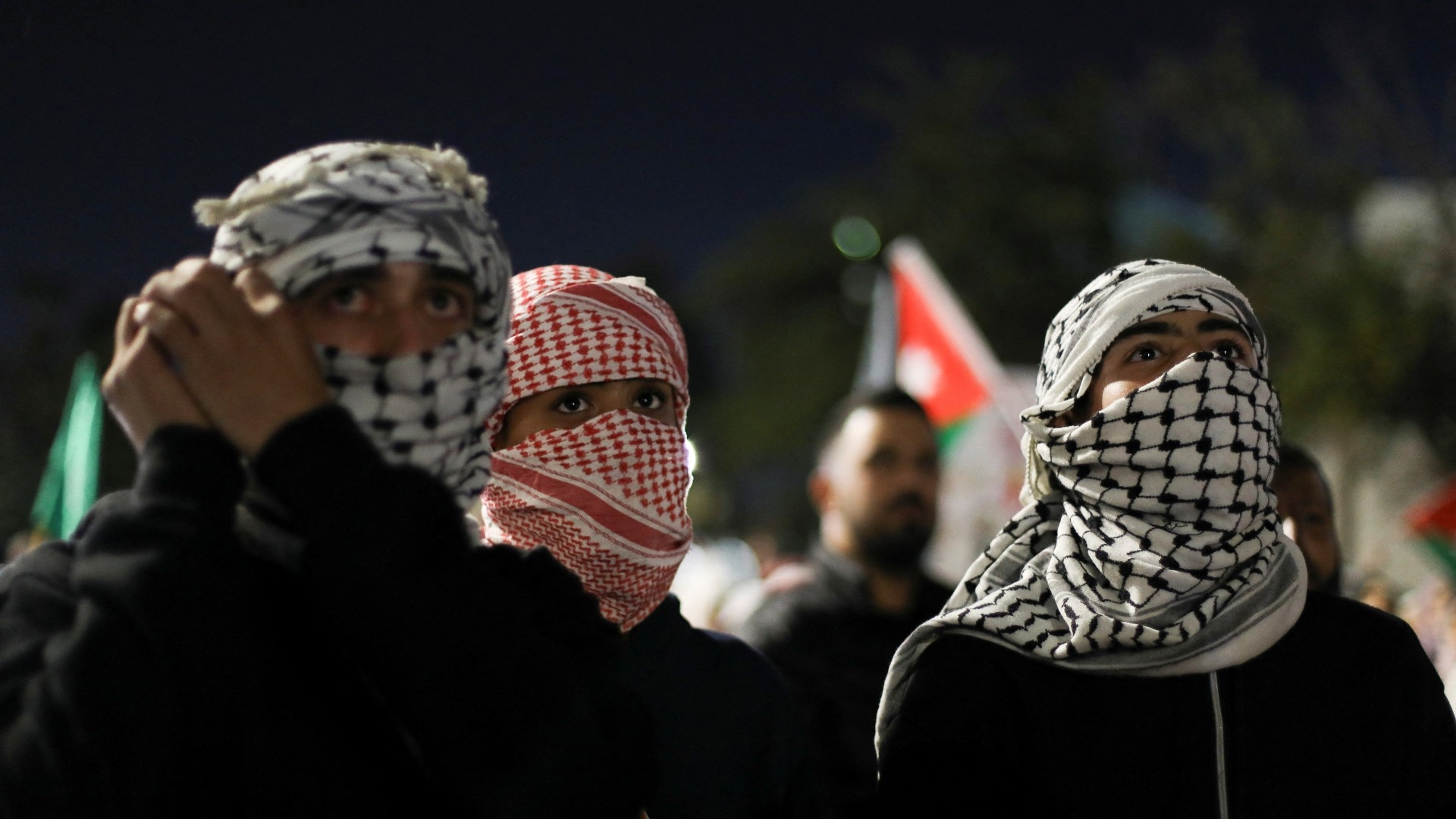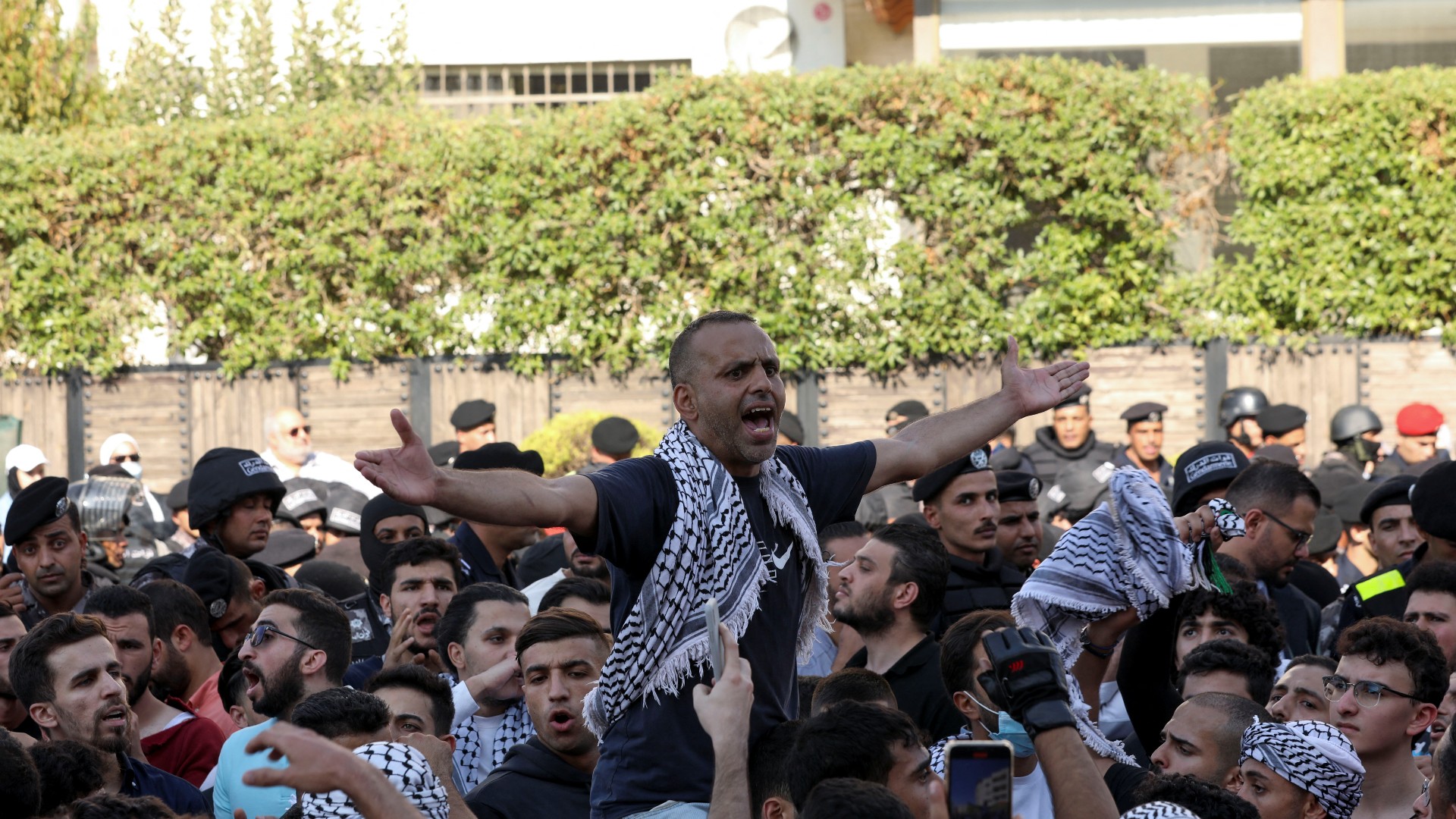Israel-Palestine war: In Jordan, young protesters want to ‘liberate Palestine’
A new generation of Jordanians have bold demands from government: Open the border and let us fight

Jordanians gather outside King Abdullah Mosque to express solidarity with Palestinians in Gaza, in Amman, Jordan, 17 October 2023 (Reuters)
By Mohammad Ersan in Amman
Published date: 20 October 2023
On Wednesday night, two kilometres away from the Israeli embassy in the Jordanian capital, Ali Abu Musameh held a sign that reads, “Paradise is closer than Sinai.”
Ali, 26, and young protesters like him say they are ready to die defending the Palestinians from the Israeli occupation. They would like the Jordanian government to open the borders with Palestine and "allow them to fight there".
It was the day after the Israeli bombardment of al-Ahli hospital in Gaza that killed at least 471 displaced Palestinian civilians and patients.
Israel denied responsibility, claiming a rocket belonging to the Palestinian Islamic Jihad failed to launch properly and hit the hospital.
Jordan's King Abdullah II, however, blamed Israel and described the incident as a "massacre" and "war crime".
The Jordanian government declared three days of mourning for those killed in the hospital strike.
Israel has been waging a ferocious bombing campaign on the Gaza Strip since 7 October, when hundreds of Hamas fighters attacked Israeli communities near the coastal enclave.
Around 1,400 Israelis were killed in the Palestinian attack. The subsequent Israeli bombardment has killed at least 3,859 Palestinians, including 1,524 children as of 19 October.
Protests also broke out in cities across the Middle East and North Africa following the air strike on the hospital.
On Tuesday, hundreds of people marched to Amman's main government building, condemning a planned visit the following day by US President Joe Biden.
'We must not stand idly by'
Ali and other young protesters in Amman on Wednesday demanded the expulsion of the Israeli ambassador and the abrogation of the 1994 peace treaty with Israel, as well as the agreement to buy natural gas from Israel, which Jordan signed in 2016.
Ali's family hails from Beersheba in historic Palestine, now part of southern Israel. They were violently displaced from the area in 1948 by Zionist militias during the creation of Israel, and relocated to Jordan.
A new generation of Jordanians have bold demands from government: Open the border and let us fight

Jordanians gather outside King Abdullah Mosque to express solidarity with Palestinians in Gaza, in Amman, Jordan, 17 October 2023 (Reuters)
By Mohammad Ersan in Amman
Published date: 20 October 2023
On Wednesday night, two kilometres away from the Israeli embassy in the Jordanian capital, Ali Abu Musameh held a sign that reads, “Paradise is closer than Sinai.”
Ali, 26, and young protesters like him say they are ready to die defending the Palestinians from the Israeli occupation. They would like the Jordanian government to open the borders with Palestine and "allow them to fight there".
It was the day after the Israeli bombardment of al-Ahli hospital in Gaza that killed at least 471 displaced Palestinian civilians and patients.
Israel denied responsibility, claiming a rocket belonging to the Palestinian Islamic Jihad failed to launch properly and hit the hospital.
Jordan's King Abdullah II, however, blamed Israel and described the incident as a "massacre" and "war crime".
The Jordanian government declared three days of mourning for those killed in the hospital strike.
Israel has been waging a ferocious bombing campaign on the Gaza Strip since 7 October, when hundreds of Hamas fighters attacked Israeli communities near the coastal enclave.
Around 1,400 Israelis were killed in the Palestinian attack. The subsequent Israeli bombardment has killed at least 3,859 Palestinians, including 1,524 children as of 19 October.
Protests also broke out in cities across the Middle East and North Africa following the air strike on the hospital.
On Tuesday, hundreds of people marched to Amman's main government building, condemning a planned visit the following day by US President Joe Biden.
'We must not stand idly by'
Ali and other young protesters in Amman on Wednesday demanded the expulsion of the Israeli ambassador and the abrogation of the 1994 peace treaty with Israel, as well as the agreement to buy natural gas from Israel, which Jordan signed in 2016.
Ali's family hails from Beersheba in historic Palestine, now part of southern Israel. They were violently displaced from the area in 1948 by Zionist militias during the creation of Israel, and relocated to Jordan.
'We want the Jordanian government to allow us to remove this embassy and sever relations with the occupier'- Ali, Palestinian Jordanian
“Today I stand in the face of the occupation and its massacres. We want the Jordanian government to allow us to remove this embassy and sever relations with the occupier," he told Middle East Eye.
"We must not stand idly by.”
Ali is an accountant at a dairy company. He has no affiliation to any political movement.
Since the start of the war on Gaza on 7 October, he and his colleagues have been protesting daily.
“We do not belong to any political parties. We belong to the Jordanian people and the Palestinian people. I am here to contribute to efforts to achieve victory for the Palestinians and the right of return,” Firas, also 26 years old, told MEE.

People take part in a protest in Amman on 18 October after an Israeli air strike killed hundreds of Palestinians at Al-Ahli hospital in Gaza (Reuters)
Bilal, a third protester, came with his children to the vicinity of the Israeli embassy. “I came to support the Palestinian resistance, and to say no to bloodshed in Gaza,” he said.
Most protesters from Ali, Firas and Bilal's generation have never seen Palestine. They only hear about it on the news or from stories passed down from their families about the homes of their ancestors before the Nakba, when more than 700,000 Palestinians were expelled from their homes in 1948.
In the 1967 Middle East war when Israel seized the West Bank and Gaza, a further 300,000 Palestinians fled mostly to Jordan. There are 2.2 million UN-registered Palestinian refugees in the kingdom, but the real number of Palestinians in the country is considerably higher.
Bilal, a third protester, came with his children to the vicinity of the Israeli embassy. “I came to support the Palestinian resistance, and to say no to bloodshed in Gaza,” he said.
Most protesters from Ali, Firas and Bilal's generation have never seen Palestine. They only hear about it on the news or from stories passed down from their families about the homes of their ancestors before the Nakba, when more than 700,000 Palestinians were expelled from their homes in 1948.
In the 1967 Middle East war when Israel seized the West Bank and Gaza, a further 300,000 Palestinians fled mostly to Jordan. There are 2.2 million UN-registered Palestinian refugees in the kingdom, but the real number of Palestinians in the country is considerably higher.
'They are besieged people. We should not forget our brothers'- Hadeel al-Sa’bii, 27
Some young protesters tried to storm the Israeli embassy building in Amman on Wednesday from the side roads, and some had Molotov cocktails, but they were dispersed by security forces.
The Jordanian security services said later that evening that some officers were wounded and had to be hospitalised as a result of clashes with protesters.
"Everyone must abide by the law and the instructions of the security personnel who are there to protect them and guarantee their right to express their opinion freely,” a police statement read.
A Jordanian security source denied rumours that the protesters had managed to storm the embassy, and told Middle East Eye that the protesters had been dealt with and removed from the surroundings.
However, the young protesters are demanding that the Jordanian authorities “open the borders, expel the Israeli ambassador, and sever relations with the occupation." Chanting “No embassy, no ambassador on Jordanian soil,” the protesters were also filmed burning the American flag.
Read More »
According to Fakher, a student activist, a significant number of the participants at the protest were university students, “despite all attempts to exclude the students from official and security matters.”
These young people are coming out to demand the "liberation of Palestine", said Fakher, despite the Jordanian government's systematic amendment of school curricula to delete references to the occupation and the context of the Palestinian issue since its peace agreement with Israel.
Meanwhile, a large number of protesters were of Jordanian, East Bank origin. They were protesting for national, religious, or humanitarian reasons.
One of them, Hadeel al-Sa’bii, 27, said she was there "because of my anger and in the name of humanity, to stop this aggression and stand with the people of Gaza.
“They are besieged people. We should not forget our brothers," she told MEE. "It's also to exercise pressure to deliver aid to them.
“Today I demand that the Israeli occupation state condemn these crimes that resulted in the death of thousands of martyrs, the displacement of families, and the non-stop killing of women, children, and civilians."
According to Fakher, a student activist, a significant number of the participants at the protest were university students, “despite all attempts to exclude the students from official and security matters.”
These young people are coming out to demand the "liberation of Palestine", said Fakher, despite the Jordanian government's systematic amendment of school curricula to delete references to the occupation and the context of the Palestinian issue since its peace agreement with Israel.
Meanwhile, a large number of protesters were of Jordanian, East Bank origin. They were protesting for national, religious, or humanitarian reasons.
One of them, Hadeel al-Sa’bii, 27, said she was there "because of my anger and in the name of humanity, to stop this aggression and stand with the people of Gaza.
“They are besieged people. We should not forget our brothers," she told MEE. "It's also to exercise pressure to deliver aid to them.
“Today I demand that the Israeli occupation state condemn these crimes that resulted in the death of thousands of martyrs, the displacement of families, and the non-stop killing of women, children, and civilians."

No comments:
Post a Comment